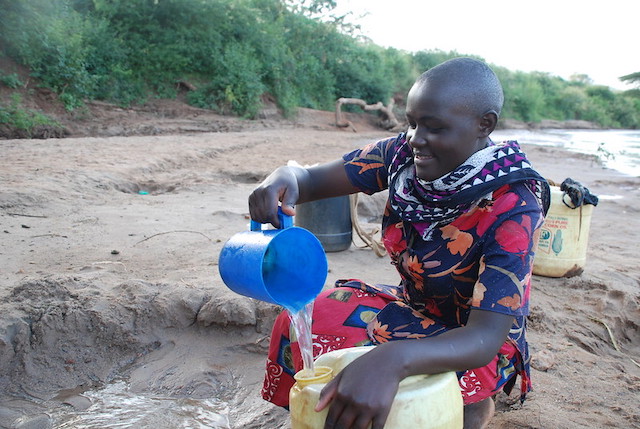Clean Water Initiative in Kenya
 Kenya, among many other areas, needs clean water. Clean water is not only a necessity for adults in Kenya but especially for children. Children need clean water for sanitation and hygiene. The number one cause of death of children age five or younger is from diseases related to water, hygiene and sanitation issues. Schools in Kenya, all suffer from not having complete access to water, hygiene and sanitation. This causes educational setbacks for children and it stunts their development and potential.
Kenya, among many other areas, needs clean water. Clean water is not only a necessity for adults in Kenya but especially for children. Children need clean water for sanitation and hygiene. The number one cause of death of children age five or younger is from diseases related to water, hygiene and sanitation issues. Schools in Kenya, all suffer from not having complete access to water, hygiene and sanitation. This causes educational setbacks for children and it stunts their development and potential.
The goal is to achieve complete access to water for everyone in Kenya by 2030. However, there are some issues preventing the completion of this goal. One major barrier is the population growth that is continuing in Kenya. People who drink from contaminated water in Kenya ranks as the third in Africa. Sub-Saharan Africa has an estimated 9.4 million people who consume contaminated water sources. Additionally, they are about 5 million people who practice open defecation in Kenya. Also in Kenya, only 14% have access to soap and water in their homes to wash their hands.
The Water Project
The Water Project is a nonprofit organization that is committed to enabling the access of clean water throughout Africa. The organization working to help communities with the clean water initiative in Kenya. According to the Water Project, access to clean water means an improvement in education, health, poverty and hunger.
Hunger can be improved by access to clean water because it is the foundation to have sustainable food sources. A lot of water is required to ensure that food will grow. So, improving water sources can change an entire community and country. At the root of poverty in Africa is water sources. The lack of clean water sources is one of the main causes of poverty. However, this is a problem that can be solved.
The Water Project and Community Engagement
The Water Project has a process that it follows for all its commitments. The organization focuses on community engagement, community education, installing the project, education follows up, monitoring and evaluation. With the help of the community, the organization can decide where it is going to work. Resources, the potential for positive outcomes and demand are a few of the main factors in its decision.
Community education is an opportunity for communities to learn about clean water resources, hygiene and sanitation. In addition, the community learn other key aspects of cooking and preparing meals using clean water sources. At the ending of the process, the organization then follows up with the community to ensure that the education process is going well and also that the project is exceeding expectations.
Kenya Integrated Water, Sanitation and Hygiene (KIWASH)
The Kenya Integrated Water, Sanitation and Hygiene (KIWASH) is a five-year program that is dedicated to the clean water initiative in Kenya. It is working to create clean and sustainable water sources. The USAID program has six key areas of focus. These areas are water access, infrastructure, sanitation and hygiene, finance, sustainability and governance.
UNICEF
UNICEF is also another organization with the determination of providing clean water sources for Kenya. It helps to establish WASH. UNICEF aims to increases access to clean water for the number of households, schools and hospitals between 2018-2022. Additionally, the organization has helped more than 6,700 communities achieve Open Defecation Free status. Almost 550,000 children use WASH hygiene and sanitation facilities. UNICEF installed more than 1,000 facilities in schools throughout Kenya.
Kenya continues to lack the appropriate access to clean water sources for all of its communities. This causes poverty and directly affects the education of young children. These children do not have the appropriate access to clean water, sanitation and hygiene. As a result, this leads to diseases which are one of the leading causes of death for young children. In addition, it leads to setbacks in their education and potential.
The Water Project has stepped in to help the clean water initiative in Kenya. The organization has set up a process that will lead to the appropriate access to clean water in Kenya’s communities. The Kenya Integrated Water, Sanitation and Hygiene (KIWASH), is working to provide more accessible water sources, sustainability and education throughout Kenya. Finally, UNICEF has helped to establish WASH, which has helped people use hygiene and sanitation facilities throughout Kenya.
– Jamal Patterson
Photo: Flickr
